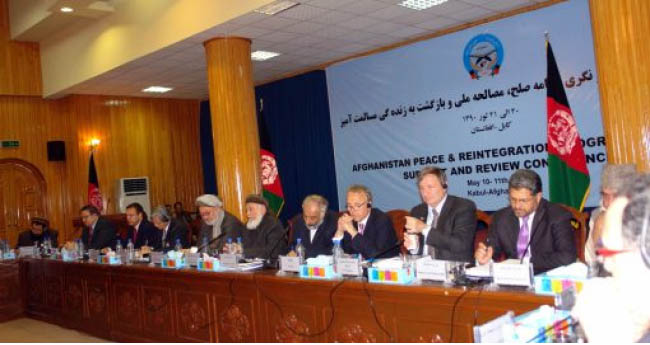With the four-nation peace initiative set to bring the Taliban into peace negotiations, the government has announced appointment of new authorities to lead the Afghan High Peace Council (HPC). According to the reports, Sayed Ahmad Gilani has been appointed as the head of the council and former vice president Mohammad Karim Khalili along with some others have been appointed as the deputies of the government peace body. The move is coming at a time when the peace efforts are entering a new phase with the four-way coordination group – comprised of Afghanistan, Pakistan, US and China – setting to kick-start formal peace talks with the Taliban. However, the main question is about the role the peace council would play in the future peace talks that would probably be led by the four-nation coordination group.
The appointments suggest that the government is considering a role for the HPC in the peace future peace talks. The peace body representing the government was formed by former president Hamid Karzai in 2010 to bring the Taliban leaders into peace negotiations and oversee the would-be talks. The HPC, however, has been largely viewed to have failed in making any progress to bring the Taliban into table of peace negotiations and setting a mechanism for ending the conflict through peace talks. The high peace council has been largely criticized for some blunders it made, or happened, that had considerable impacts on shaping its failures.
The recent efforts of the national unity government to start negotiations with the Taliban have been largely relying on Pakistan’s supportive role and the four-way mechanism to prepare a roadmap and oversee the process one it starts. The recent efforts, however, have been overwhelmingly praised for bringing about a consensus and setting a cooperation mechanism for key regional and world players. The government did not go through the HPC to pave the ground for peace talks, instead it started from Islamabad and established the four-nation mechanism.
In the recent efforts, the HPC did not have a noticeable role. Event in the crucial meetings that were held in Kabul and Islamabad, the absence of the peace council was obvious. This and the ineffectiveness of the peace council in its peace efforts resulted to speculations over the role of the HPC in possible future talks with the Taliban. As the four-nation coordination group was holding meetings to tailor a peace roadmap, there were speculations that the High Peace Council is sidelined in the peace efforts. In addition, the HPC also had its budget cut by the international community which was another sign of troubles for the council.
The recent appointments suggest that the government is reviving the peace council and considering a new but somehow marginal role for it in the main peace process. The HPC is made-up of high-profile former government officials, senior ethnic and jihadi leaders and other political leaders. The HPC brings together a large spectrum of Afghan politicians to play a role as participants of possible peace talks in the future. It is believed that a main motive for former president Hamid Karzai to establish the high peace council was to appease the many influential political and jihadi figures by considering political and economic concessions for them. This was always part of the former president’s politics of patronage.
However, President Ghani’s expectations from the HPC would definitely not the same as Hamid Karzai. Ghani has been largely known as opposing to considering ceremonial roles as political concessions for the politicians. However, realities on the ground are always bound to change politicians’ approaches. President Ghani knows well that he needs political cohesion and a national consensus in the country to promote his peace plan. In addition, he has learned lessons from last two years. Initially, the president pursued his own peace plans through Pakistan largely without seeking endorsement of the Afghan political spectrum. He took the initiative in his hand and actively pursued his agenda. Due to this, some of his bold overtures to Pakistan in hope of the country’s help in the process met fierce resistance at home and forced him to backtrack on many of his initiatives to advance his peace initiative.
When the Afghan government sits on the table of negotiations with the Taliban, it would need to sell its peace plans and agreements to the public and the political community in the country. The government would not be able to reach a peace deal with the Taliban without promoting a national consensus and seeking endorsement of the country’s political spectrum. According to government officials, President Ashraf Ghani has expressed hope in a meeting over the recent appointments that the new leadership of the HPC would promote and create political and national consensus by help of the past experiences and based on the peace roadmap. The president has not talked about any specific task for the peace council in leading the peace process.
It is clear enough that the government has now defined a different role for the HPC. The HPC would play a supportive role in the process by seeking national consensus and political cohesion over the peace process. It is obvious that the initiative of the high peace council was an absolute failure. In fact, the HPC cannot be a body to be able to bring the Taliban on the table of negotiations and negotiate a peace deal with the militants. The current peace efforts seem to be in the right direction with the four-nation initiative set to lead the supposed peace talks. However, there is a lot to be done at national level to forge consensus over the peace process. It is hoped that the high peace council would be able to play a supportive role and be as a stage for promoting political consensus over the peace process.
Home » Opinion » Is the High Peace Council Sidelined?
Is the High Peace Council Sidelined?
| Abdul Ahad Bahrami

